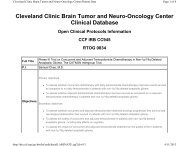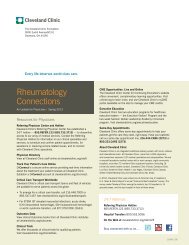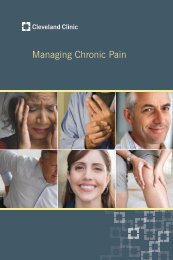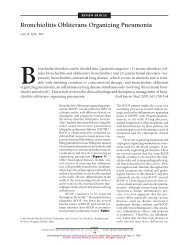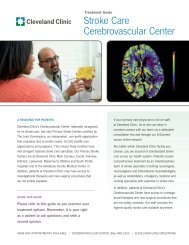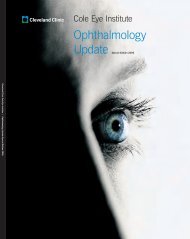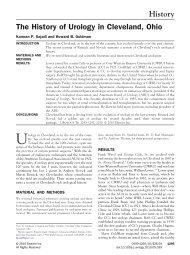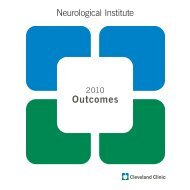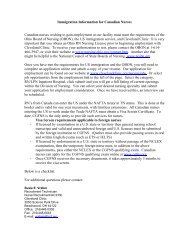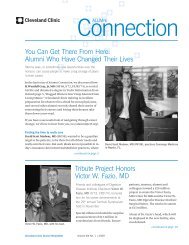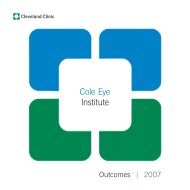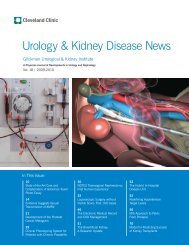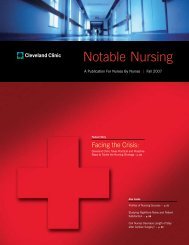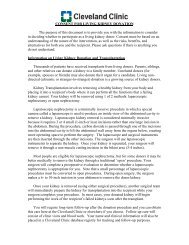Create successful ePaper yourself
Turn your PDF publications into a flip-book with our unique Google optimized e-Paper software.
216.448.1039 Spring 2009<br />
quote<br />
“By activating more resources earlier,<br />
we hope to reduce ICU admissions and<br />
patient mortality.”<br />
Barbara Morgan, MSN, RN, CAN<br />
As the situation unfolds at the bedside, it can be a learning<br />
experience for the nurse at any stage in his or her career.<br />
Some studies have suggested that non-intensive care nurses<br />
learn better assessment skills from interacting with rapid<br />
response teams.<br />
The nurse calls the attending physician at the same time<br />
the rapid response team is called, but the teams have the<br />
advantage of being in-house 24/7 and often can arrive at the<br />
patient’s bedside ahead of the physician. The team takes<br />
report from the nurse who made the call, performs an<br />
assessment and initiates appropriate intervention to stabilize<br />
the patient, collaborating with the physician when he or she<br />
arrives. Equipped with high-level point-of-care capabilities,<br />
including portable ECGs and blood analyzers, the team can<br />
obtain immediate test results.<br />
The pediatric team averages about four calls a month, a<br />
number that Pediatric <strong>Nursing</strong> Director Janie Burke, MBA,<br />
BSN, RN, CPN, hopes will grow.<br />
keLLy HANCoCk earned a bachelor’s degree<br />
in <strong>Nursing</strong> from ursuline College and returned<br />
there for a master’s degree in <strong>Nursing</strong>, which<br />
she completed in May 2007. She is a member<br />
of the American Association of Heart Failure<br />
Nurses, the American Association of Critical<br />
Care Nurses, the American Academy of<br />
Ambulatory Care Nurses and the Preventive<br />
Cardiovascular Nurses Association.<br />
Email comments to hancock@ccf.org.<br />
As of January 2009, patients’ families now are authorized<br />
to call the team if they have a concern about their child and<br />
believe intervention is needed, she explains. “The physicians<br />
and nurses can evaluate a child clinically, but we believe<br />
that the parents know their child the best and can tell when<br />
something isn’t right. We educate parents on appropriate<br />
use of the team and its resources in these situations.”<br />
The cardiac team averages three calls a day from in- and<br />
outpatient areas. “All nurses on the team are certified in<br />
advanced cardiac life support so they provide an additional<br />
set of hands to assist the bedside nurse in whatever intervention<br />
is necessary to stabilize the patient,” says Heart<br />
Center <strong>Clinic</strong>al Director Kelly Hancock, MSN, RN, NE-BC.<br />
In 2008 the adult team responded to 892 calls — more than<br />
100 of them in December. This is good news, Morgan says,<br />
because it reflects growing awareness of the team and its<br />
capabilities. “We are seeing the number of rapid response<br />
team calls increase and the number of codes decrease. We<br />
want to see that pattern continue and hope to demonstrate<br />
an impact on outcomes.”<br />
BARBARA MoRgAN completed her bachelor’s<br />
of science in <strong>Nursing</strong> at the ohio State<br />
university and her master’s degree in <strong>Nursing</strong><br />
at ursuline College. She is a member of the<br />
Emergency Nurse’s Association, the American<br />
organization of Nurse Executives and Sigma<br />
Theta Tau. She earned a Certification in <strong>Nursing</strong><br />
Administration in 2006.<br />
Email comments to morganb@ccf.org.<br />
13



